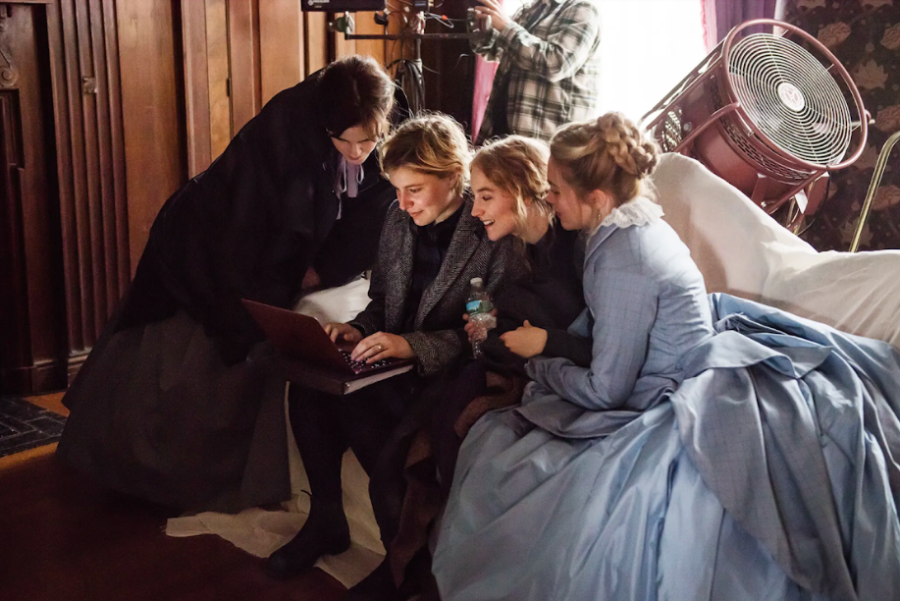Greta Gerwig’s “Little Women” Have Big Ambitions
“Little Women,” directed by Greta Gerwig, is an authentic illustration of emotion, the abundant variations of female ambition and the bond between four sisters. The camera seems to be in constant motion, subtly moving with the characters or fluidly through the scene. This camera movement contributes to the natural feeling of the film along with the overlapping and dynamic dialogue that brings the audience into the minds and lives of the characters. Time moves nonlinearly as the editing weaves in and out of the past and present. Warm golden tinted light signifies the youthful joy of childhood, and cooler blues of the present impart the feeling of getting older and growing up.
From the opening scene, when she walks into the publishing office to have her writing published, Jo (Saoirse Ronan) has an individuality, a presence and a sense of self. She carries her wonder and curiosity for life throughout the narrative. Jo’s story is deeply connected to and intertwined with that of her three sisters Beth (Eliza Scanlen), Meg (Emma Watson) and Amy (Florence Pugh), and the paths they take in their lives.
The film portrays a myriad of complex female characters, following them as they come of age together, navigating the world and the sadness of losing that golden hue of childhood. I have always loved the way this film does not dictate that there is a certain way for a woman to be or what a woman should want. Meg, the oldest of the March sisters, speaks a crucial line in this film; holding Jo’s hands, Meg tells Jo, “Just because my dreams are different than yours doesn’t mean they’re unimportant.” Watson’s delivery of the line feels so natural and true, it is not reprimanding Jo for her wishes to be a writer, and it does not discount Meg’s own wishes for a family; it simply states that each of their dreams are important.
Another impactful moment is Jo’s monologue towards the end of the film: “I just feel like women, they have minds, and they have souls as well as just hearts, and they’ve got talent, as well as just beauty, and I’m so sick of people saying that love is just all a woman is fit for, I’m so sick of it.” Louisa May Alcott’s writing is radiant in Gerwig’s adaptation of “Little Women” — the timelessness of her message can be felt throughout the film, but is articulated especially well in this scene.
There are not just a few impactful moments like those mentioned above in this film, but the feeling is embedded in its cinematography, characters and the context of its production. Not only is the film a narrative telling the story of four women and their experiences, but it is directed by a woman, Gerwig. There is still a gaping inequality in the number of female directors. According to Kim Elsesser from Forbes, in the top 250 grossing films of 2022, women comprised 24% of directors, writers, producers, editors and cinematographers working on these films. “Little Women” being directed by a woman enhances the film’s theme of being able to use your own voice to tell stories like this, a story both inspired by and inspiring to women.
The way the actresses embody their roles and the blocking of the scenes is done naturally so that there is always motion. This freedom of the characters to move within the scenes pushes against the idea of girls and women needing to be accommodating, sit still and not take up room. The March sisters can express themselves fully, taking up space unapologetically because they do not need to apologize for the way they exist.
Gerwig’s choice to tell the story by moving between adulthood and childhood makes the story even more poignant. Getting to feel the juxtaposition of these timeframes as the characters move throughout their lives is reflective of the nature of growing up. The childhood scenes do not feel like flashbacks; they are just as real and as true as the scenes in adulthood. This places value in the experiences of the girls’ childhoods, not passing off these parts of their lives because of their youth.
At the heart of the film is a story of hopefulness, connection and finding one’s way in the world. “Little Women”’s authentic representation of curious, feeling and complex women is inspiring. It instills an excitement for life and the feeling that our dreams, ambitions and hopes matter and have value.











































































































































































































